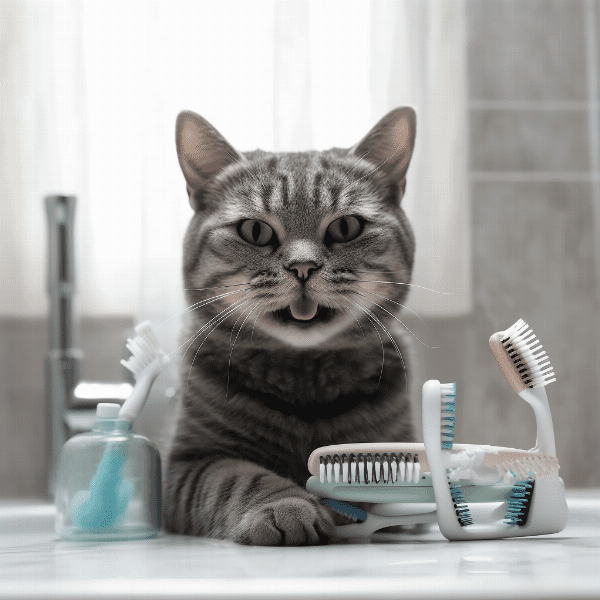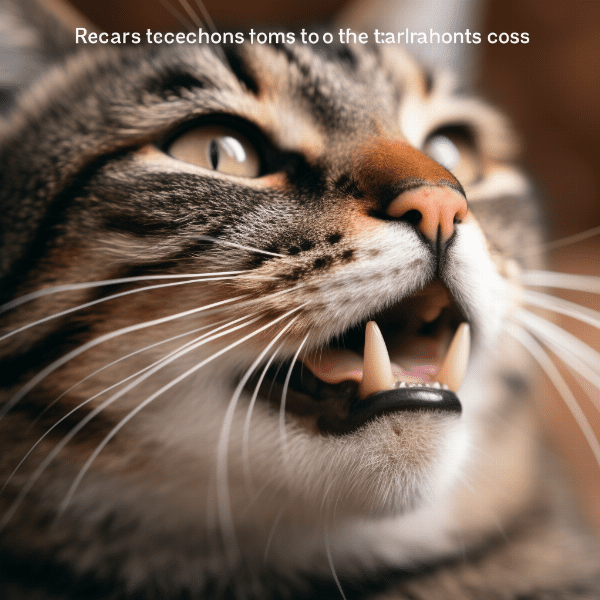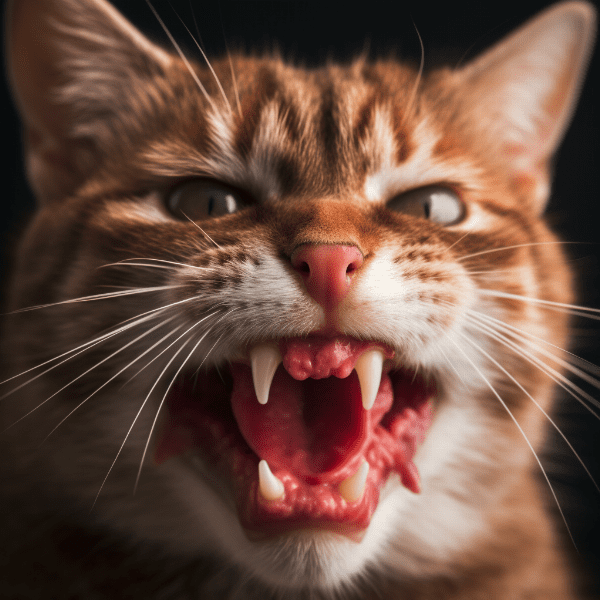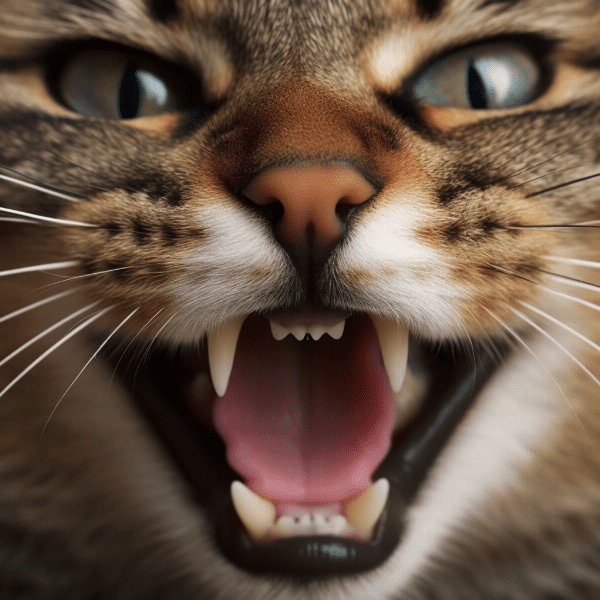Table of Contents
- Understanding Tartar Buildup in Cats
- Signs and Symptoms of Tartar Buildup in Cats
- Importance of Managing Tartar Buildup in Cats
- Tips for Preventing Tartar Buildup in Cats
- Best Practices for Brushing Your Cat’s Teeth
- Other Dental Care Options for Cats
- Foods that Can Help Manage Tartar Buildup in Cats
- Professional Dental Care for Cats
- Potential Complications of Untreated Tartar Buildup in Cats
- Conclusion: Maintaining Your Cat’s Dental Health
Understanding Tartar Buildup in Cats
Tartar buildup in cats, also known as dental calculus, is a common problem that can lead to a variety of dental health issues. Tartar is formed when minerals in the saliva combine with food particles and bacteria to create a hard, yellow or brown deposit on the teeth.
How Does Tartar Buildup Affect Your Cat’s Oral Health?
As tartar builds up on your cat’s teeth, it can cause inflammation and irritation of the gums, a condition known as gingivitis. This can lead to bleeding and swollen gums, as well as bad breath. If left untreated, tartar buildup can progress to periodontal disease, which can cause tooth loss and even spread to other parts of the body, including the kidneys, liver, and heart.
What Causes Tartar Buildup in Cats?
Tartar buildup in cats can be caused by a variety of factors, including poor dental hygiene, a diet high in carbohydrates, and certain medical conditions. Cats who do not receive regular dental cleanings or who do not have their teeth brushed regularly are more likely to develop tartar buildup. Additionally, diets high in carbohydrates and low in protein can contribute to tartar formation. Certain medical conditions, such as kidney disease, can also increase a cat’s risk of developing tartar buildup.
How to Determine if Your Cat Has Tartar Buildup?
The signs of tartar buildup in cats can include yellow or brown discoloration of the teeth, bad breath, inflamed gums, and difficulty eating or chewing. If you suspect your cat has tartar buildup, it is important to consult with your veterinarian, who can perform a dental exam and determine the best course of treatment.
Conclusion
Tartar buildup in cats is a serious issue that can lead to a variety of dental and health problems. By understanding the causes and symptoms of tartar buildup, you can take steps to prevent it from occurring in your cat and maintain their overall health and wellbeing. In the next section, we will discuss the signs and symptoms of tartar buildup in cats in more detail.

Signs and Symptoms of Tartar Buildup in Cats
Recognizing the signs and symptoms of tartar buildup in cats is an important step in maintaining your cat’s dental health. Here are some common signs to watch out for:
Discolored Teeth
One of the most obvious signs of tartar buildup in cats is discolored teeth. Tartar buildup appears as a yellow or brown layer on the teeth and can be difficult to remove with regular brushing.
Bad Breath
Another common sign of tartar buildup in cats is bad breath, which can be caused by the bacteria that accumulate on the teeth and gums. If your cat’s breath has an unpleasant odor, it may be a sign that they have tartar buildup.
Inflamed Gums
Inflamed or swollen gums can be an indication of tartar buildup in cats. As tartar accumulates on the teeth and irritates the gums, they can become inflamed and red.
Difficulty Eating
Cats with severe tartar buildup may have difficulty eating or chewing their food. This can be due to pain or discomfort caused by inflamed gums or loose teeth.
Changes in Behavior
Finally, changes in behavior can also be a sign of tartar buildup in cats. Cats with dental pain may be more irritable or withdrawn than usual, and may be less interested in playing or interacting with their owners.
Conclusion
Tartar buildup in cats can cause a variety of symptoms that can have a negative impact on their overall health and wellbeing. By recognizing the signs and symptoms of tartar buildup, you can take action to prevent it from becoming a more serious problem. In the next section, we will discuss why it is important to manage tartar buildup in cats.
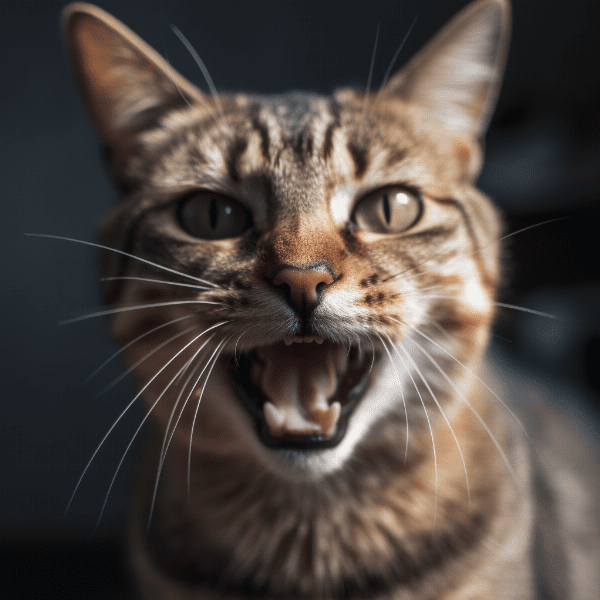
Importance of Managing Tartar Buildup in Cats
Managing tartar buildup in cats is an important aspect of their overall health and wellbeing. Here are some reasons why it is important to take care of your cat’s dental health:
Preventing Dental Pain and Discomfort
Tartar buildup can cause inflammation and infection of the gums, which can be very painful for cats. By managing tartar buildup, you can prevent your cat from experiencing dental pain and discomfort.
Avoiding Tooth Loss
Untreated tartar buildup can lead to periodontal disease, which can cause tooth loss in cats. By managing tartar buildup, you can help your cat keep their teeth for as long as possible.
Maintaining Overall Health
Poor dental health can have a negative impact on a cat’s overall health. Bacteria from dental infections can spread to other parts of the body and cause serious health problems. By managing tartar buildup, you can help prevent these complications and keep your cat healthy.
Saving Money on Vet Bills
Preventing dental problems in cats can help you save money on vet bills in the long run. Treating dental problems can be expensive, especially if they require extensive dental work or surgery.
Improving Quality of Life
Finally, managing tartar buildup can improve your cat’s quality of life. Cats with dental pain or discomfort may have trouble eating, drinking, and playing. By managing tartar buildup, you can help your cat stay healthy, active, and happy.
Conclusion
Managing tartar buildup in cats is an important aspect of their overall health and wellbeing. By preventing dental pain and discomfort, avoiding tooth loss, maintaining overall health, saving money on vet bills, and improving quality of life, you can help your cat live a long and healthy life. In the next section, we will discuss some tips for preventing tartar buildup in cats.

Tips for Preventing Tartar Buildup in Cats
Preventing tartar buildup in cats is an important part of their dental care. Here are some tips to help keep your cat’s teeth healthy and free of tartar:
Regular Brushing
Regular brushing is one of the most effective ways to prevent tartar buildup in cats. You can use a soft-bristled toothbrush and specially-formulated toothpaste to brush your cat’s teeth. It is important to start slowly and gradually increase the amount of time your cat spends getting their teeth brushed.
Dental Chews and Treats
Dental chews and treats can also help prevent tartar buildup in cats. These treats are designed to scrape away plaque and tartar as your cat chews on them. Be sure to choose treats that are low in calories and do not contain any harmful ingredients.
Balanced Diet
Feeding your cat a balanced diet can also help prevent tartar buildup. Choose a high-quality cat food that is low in carbohydrates and high in protein. Avoid feeding your cat table scraps or human food, as this can contribute to tartar buildup.
Water Additives
Water additives can also help prevent tartar buildup in cats. These additives are designed to be added to your cat’s water bowl and can help kill bacteria and reduce plaque buildup.
Regular Veterinary Checkups
Regular veterinary checkups are an important part of preventing tartar buildup in cats. Your veterinarian can perform a dental exam and recommend any necessary dental cleanings or treatments.
Conclusion
Preventing tartar buildup in cats is an important aspect of their dental health. By regularly brushing your cat’s teeth, feeding them a balanced diet, providing dental chews and treats, using water additives, and scheduling regular veterinary checkups, you can help keep your cat’s teeth healthy and free of tartar. In the next section, we will discuss the best practices for brushing your cat’s teeth.
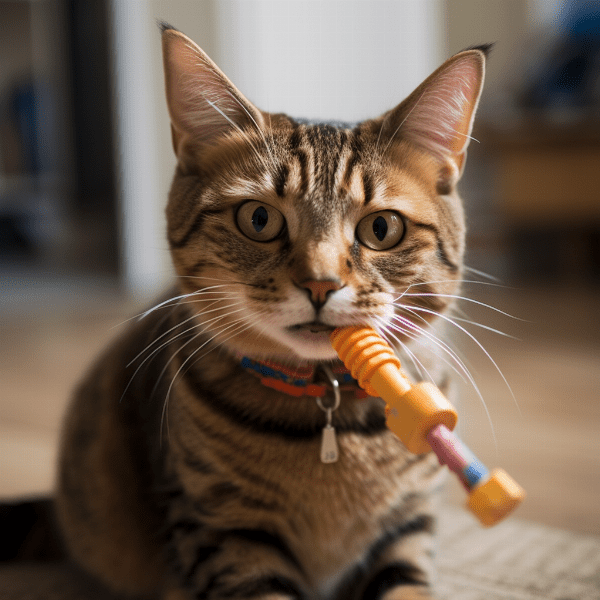
Best Practices for Brushing Your Cat’s Teeth
Brushing your cat’s teeth is an important part of preventing tartar buildup and maintaining their dental health. Here are some best practices for brushing your cat’s teeth:
Start Slowly
It is important to start slowly when introducing your cat to tooth brushing. Begin by getting them used to having their mouth handled, then gradually introduce the toothbrush and toothpaste.
Use the Right Tools
Use a soft-bristled toothbrush and specially-formulated toothpaste designed for cats. Avoid using human toothpaste, as it can be harmful to cats.
Brush Regularly
Brush your cat’s teeth at least two to three times a week. This will help prevent tartar buildup and maintain their dental health.
Use Gentle Pressure
When brushing your cat’s teeth, use gentle pressure and a circular motion. Be sure to brush both the front and back teeth.
Reward Your Cat
Reward your cat for good behavior during tooth brushing. This can help make the process more enjoyable for both you and your cat.
Seek Professional Help
If your cat is resistant to tooth brushing or has severe tartar buildup, it may be necessary to seek professional help from your veterinarian. They can perform a dental cleaning and provide recommendations for at-home dental care.
Conclusion
Brushing your cat’s teeth is an important part of preventing tartar buildup and maintaining their dental health. By starting slowly, using the right tools, brushing regularly, using gentle pressure, rewarding your cat, and seeking professional help when necessary, you can help keep your cat’s teeth healthy and free of tartar. In the next section, we will discuss other dental care options for cats.
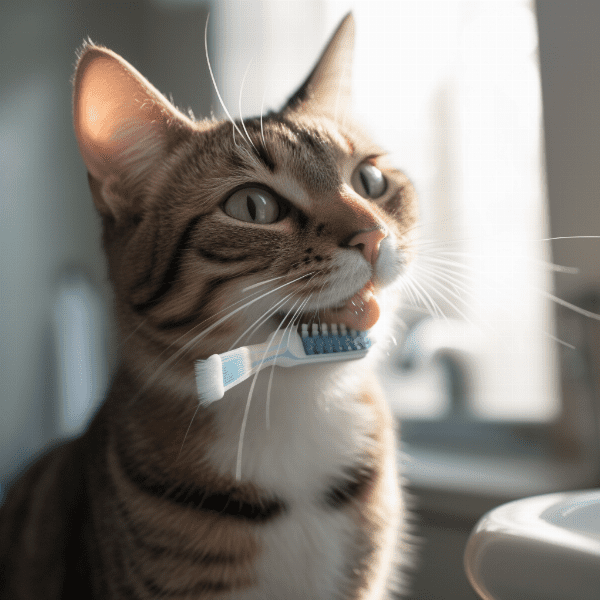
Other Dental Care Options for Cats
In addition to brushing your cat’s teeth, there are other dental care options that can help prevent tartar buildup and maintain their dental health. Here are some options to consider:
Dental Wipes
Dental wipes are a convenient alternative to tooth brushing. They are designed to be used on the teeth and gums to remove plaque and tartar. Be sure to choose wipes that are specifically formulated for cats.
Oral Rinses
Oral rinses are another option for maintaining your cat’s dental health. These rinses are designed to be added to your cat’s drinking water and can help kill bacteria and reduce plaque buildup.
Dental Toys
Dental toys can also help prevent tartar buildup in cats. These toys are designed to be chewed on and can help scrape away plaque and tartar. Be sure to choose toys that are specifically designed for cats and are made from safe, non-toxic materials.
Prescription Diets
Prescription diets can also be effective in preventing tartar buildup in cats. These diets are formulated with ingredients that are designed to scrape away plaque and tartar as your cat chews on their food. Be sure to talk to your veterinarian before changing your cat’s diet.
Conclusion
In addition to brushing your cat’s teeth, there are other dental care options that can help prevent tartar buildup and maintain their dental health. Dental wipes, oral rinses, dental toys, and prescription diets are all options to consider. By incorporating these options into your cat’s dental care routine, you can help prevent tartar buildup and maintain their overall health and wellbeing. In the next section, we will discuss foods that can help manage tartar buildup in cats.
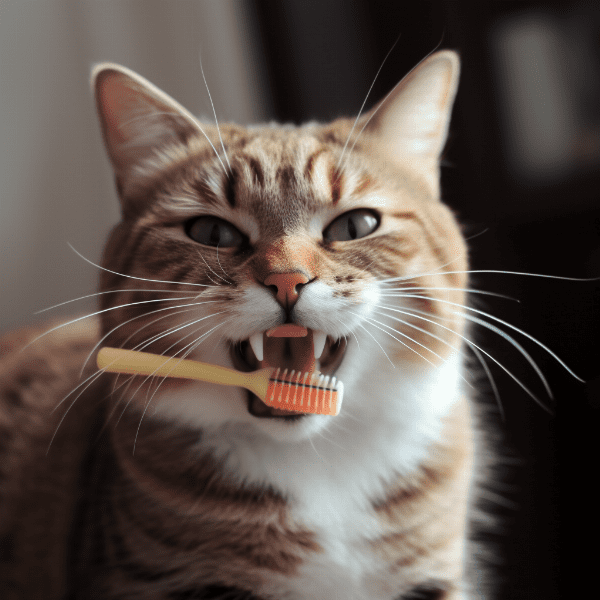
Foods that Can Help Manage Tartar Buildup in Cats
Feeding your cat the right foods can also help prevent tartar buildup and maintain their dental health. Here are some foods that can help manage tartar buildup in cats:
Dry Food
Dry food can help prevent tartar buildup in cats by mechanically scraping away plaque and tartar as your cat chews on the kibble. Be sure to choose high-quality dry food that is specifically formulated to promote dental health.
Wet Food
Wet food can also be beneficial for managing tartar buildup in cats. The moisture in wet food can help flush away bacteria and food particles that can contribute to tartar formation.
Raw Bones
Raw bones can be a natural way to prevent tartar buildup in cats. The act of chewing on raw bones can help scrape away plaque and tartar, while also providing important nutrients for your cat.
Dental Treats
Dental treats are specifically designed to promote dental health in cats. These treats are formulated with ingredients that help scrape away plaque and tartar as your cat chews on them.
Conclusion
Feeding your cat the right foods can be an effective way to prevent tartar buildup and maintain their dental health. Dry food, wet food, raw bones, and dental treats are all options to consider. Be sure to talk to your veterinarian before making any changes to your cat’s diet. In the next section, we will discuss professional dental care options for cats.
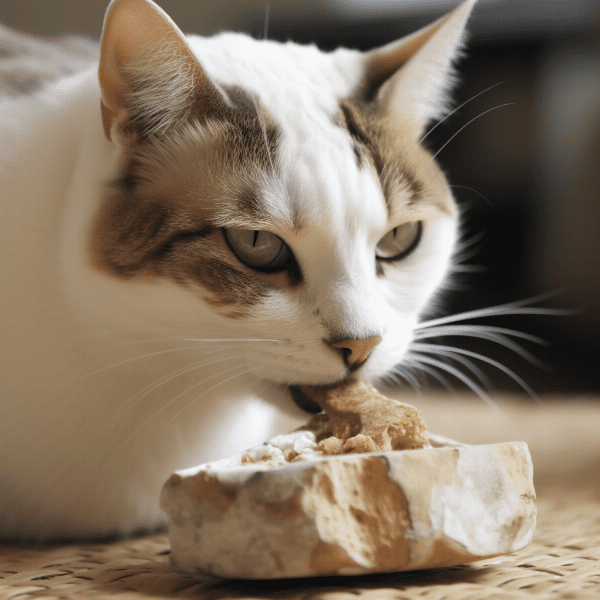
Professional Dental Care for Cats
Professional dental care is an important aspect of maintaining your cat’s dental health. Here are some professional dental care options for cats:
Dental Exams
Regular dental exams are an important part of maintaining your cat’s dental health. During a dental exam, your veterinarian can evaluate your cat’s teeth and gums and recommend any necessary treatments.
Dental Cleanings
Professional dental cleanings are necessary to remove tartar buildup that cannot be removed through regular brushing. During a dental cleaning, your veterinarian will use specialized tools to remove tartar and plaque from your cat’s teeth.
Dental X-Rays
Dental x-rays can help your veterinarian identify dental problems that may not be visible on the surface. This can include issues with the roots of the teeth, the jawbone, and the underlying structures of the mouth.
Dental Surgery
In some cases, dental surgery may be necessary to treat dental problems in cats. This can include tooth extractions, root canals, and other procedures.
Anesthesia
Most professional dental procedures for cats require anesthesia. This is to ensure that your cat remains still and comfortable during the procedure.
Conclusion
Professional dental care is an important aspect of maintaining your cat’s dental health. Dental exams, cleanings, x-rays, surgery, and anesthesia are all options to consider. By working with your veterinarian, you can develop a comprehensive dental care plan that meets your cat’s specific needs. In the final section, we will summarize the key takeaways from this article.
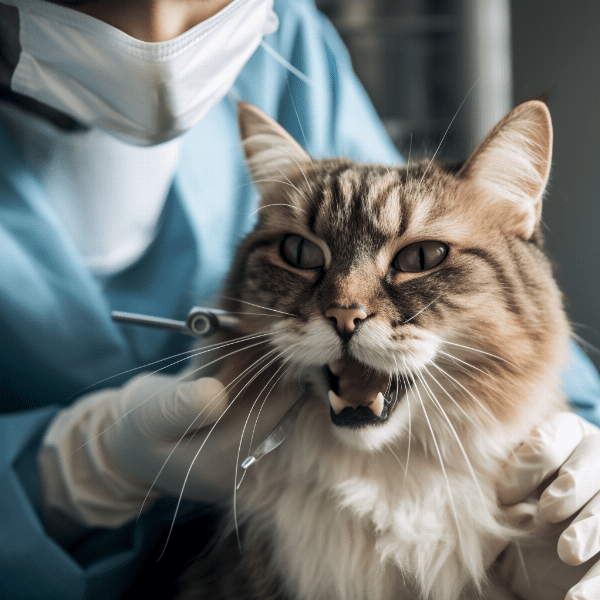
Potential Complications of Untreated Tartar Buildup in Cats
Untreated tartar buildup in cats can lead to a variety of serious complications. Here are some potential complications to be aware of:
Periodontal Disease
Periodontal disease is a serious dental problem that can occur as a result of untreated tartar buildup. This condition can lead to tooth loss, bone loss, and other serious complications.
Tooth Loss
Untreated tartar buildup can cause teeth to become loose and eventually fall out. This can make it difficult for cats to eat and can cause them pain and discomfort.
Infections
Tartar buildup can cause infections in the gums and other structures of the mouth. These infections can spread to other parts of the body and cause serious health problems.
Chronic Pain
Untreated tartar buildup can cause chronic pain in cats. This can make it difficult for them to eat, drink, and play, and can have a negative impact on their overall quality of life.
Decreased Lifespan
Poor dental health can have a negative impact on a cat’s overall health and wellbeing. Untreated tartar buildup can lead to serious health problems that can shorten a cat’s lifespan.
Conclusion
Untreated tartar buildup in cats can lead to a variety of serious complications, including periodontal disease, tooth loss, infections, chronic pain, and decreased lifespan. By recognizing the signs and symptoms of tartar buildup and taking steps to prevent and treat it, you can help your cat maintain their dental health and overall wellbeing.
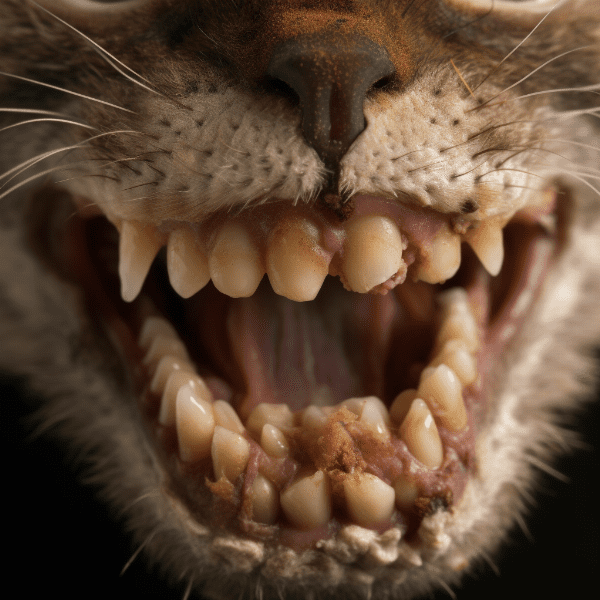
Conclusion: Maintaining Your Cat’s Dental Health
Maintaining your cat’s dental health is an important aspect of their overall health and wellbeing. By understanding tartar buildup, recognizing the signs and symptoms, and taking steps to prevent and treat it, you can help keep your cat’s teeth healthy and free of tartar.
In this article, we discussed the importance of managing tartar buildup in cats, the signs and symptoms to watch out for, and various tips for preventing and treating it. We also discussed other dental care options for cats, including foods that can help manage tartar buildup and professional dental care options.
Remember to brush your cat’s teeth regularly, feed them a balanced diet, and incorporate other dental care options into their routine. Be sure to schedule regular veterinary checkups and professional dental cleanings as needed. By taking these steps, you can help your cat maintain their dental health and live a long and healthy life.
Thank you for reading this article on maintaining your cat’s dental health. If you have any questions or concerns about your cat’s dental health, be sure to talk to your veterinarian.
